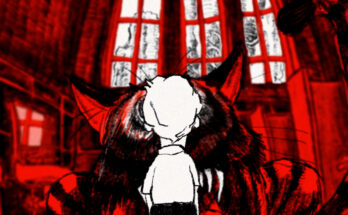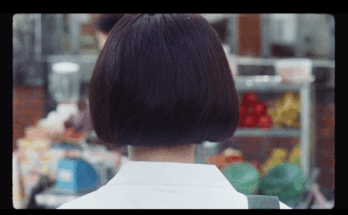Want to hear more from the actors and creators of your favorite shows and films? Subscribe to The Cinema Spot on YouTube for all of our upcoming interviews!
Managing editor & film and television critic with a Bachelor's of Arts in English Literature with a Writing Minor from the University of Guam. Currently in graduate school completing a Master's in English Literature.
Returning to Tribeca with a few handfuls of reviews in store for June 2025, I needed to start with the types of storytelling that speak to me. As one of the first four shorts I got to see, Playing God appeals to me straightaway from the looks of it. This French-Italian stop-motion animated horror thriller short film is not necessarily a mimicry of Biblical birth. Rather, it depicts what it feels like to be in control or controlled. More can be said beyond its nine-minute runtime, but the narrators offer just a glimpse of horror.
Playing God is co-written by editors Matteo Burani and Gianmarco Valentino and is directed by Burani.
In this review, I will discuss Playing God. As this article’s title suggests, no spoilers will be present.
Tribeca’s Playing God Logline
According to the Tribeca website, here is the official logline for Matteo Burani and Gianmarco Valentino’s stop-motion animated horror thriller Tribeca short, Playing God.
A clay sculpture comes to life in the darkness of workshop, surrounded by strange creatures…
Tribeca Film
Discussion
Burani and Valentino are magnificent storytellers, and while I would love more to be told about the figures or models—referred to as the “sculpture[s]” and “creatures” of “God”—, a fine job has been done here. The narrative beats from the main character’s conscious awakening to God’s examination of his creation to the results of his work are easy to follow. However, the imagery emphasizes the inverse of what Christians know of in the end of Genesis Chapter 1: “Let us make man in our image, after our likeness: and let them have dominion … over every creeping thing that creepeth upon the earth. So God created man in his own image, in the image of God created he him” (Genesis 1:26-27).
Without giving away its finality, Playing God is harsh, albeit not cruel. It displays God as a presence who departs at the crucial moment of judgment. The Tribeca short is a moving picture of what it means to remake humanity for satisfaction’s sake. Sound designer Quentin Robert crafts chilling sounds, such as the heavy footsteps of “God” entering the darkened room. Furthermore, music composer Pier Danio Forni’s juxtaposition of a godly, heaven-sent scoring with the horrific scoring towards the end is great for the alterations in mood.
Burani and the animation team are intriguing with their sculptures of Scripture. The mold of God himself is humanlike, more so than his sculptures. It’s also remarkable to make him a left-handed personality, as if that makes him more insightful and observant of his creations. I also admire the stark juxtaposition with creation #815 and those before him—pristine versus marred.
Otherness and Sameness
Under the Tribeca short film’s Biblical temperaments are Burani and Valentino’s alterity and likeness. In his critical text, The Expulsion of the Other: Society, Perception and Communication Today, South Korean-German philosopher and cultural theorist Byung-Chul Han defines alterity, or “Otherness”, as…unique. Of Sameness, he writes:
The proliferation of the Same presents itself as growth. At a certain point, however, production is no longer productive but destructive, information is no longer informative but deformative, and communication is no longer communicative but merely cumulative.
Byung-Chul Han in ‘The Expulsion of the Other’ Chapter 1: “The Terror of the Same”
Han explains that there is no experience, insight, or knowledge in Sameness; it is terrifying for reasons such as this. Essentially, to possess these attributes means to have pain. In doing so, a state of Otherness forms a stable identity. It is this state that asserts being and existence. In terms of alienation, Han cites the late German theorist Karl Marx’s comparison of power dynamics with religion: “[T]he greater his product, the less is [God] himself” (46). Playing God‘s idea of God as anything but all-knowing is a merit-worthy position to hold.
Moreover, Han cites the late French philosopher Jean-Paul Sartre’s idea of the Other’s presence announced as a “gaze”. Han describes: “[B]eing gazed upon is the central aspect of Being-in-the-world. World is gaze” (54). Sure, to be perceived is to be unique as an Other; however, what exactly does that entail?
Gothic Abjection
Ultimately, what I love about Playing God is the realization of true, authentic horror. After all, we are born to be God-fearing men in one way or another, right? In his critical text, American Gothic Fiction: An Introduction, the late American literature professor Allan Lloyd-Smith highlights domestic abjection as “the strange within the familiar … bound up with the idea of the house, gender, and the family” (94, 102). If the world—as dark and tenebrous as it could be—is a home for humans made by God, then surely there is a sense of terror, of horror, of abjection in the atmosphere. Burani and Valentino create that as the Gods of their stop-motion motion picture to the point of brilliance.

The Crew Behind Playing God
Shanti Bourse serves as the artistic director. Producer Arianna Gheller serves as the animator of the Tribeca short.
Guglielmo Trautvetter serves as the director of photography. Trautvetter also serves as the lighting and camera operator.
Pier Danio Forni scores the music. Quentin Robert serves as the sound designer.
Valentino serves as the storyboard and animatic artist.
Gheller and Burani are the art directors. Burani also serves as the sculptor and props maker.
Sole Piccininno serves as the puppet maker. Edueard Puertas and Burani are the armaturists.
Chiara Ziveri serves as the SFX makeup artist.

Final Thoughts on the Tribeca Short Film, Playing God
Playing God could lead to a tale of the Master and the Slave. Interestingly enough, though, Burani, Valentino, and their team do not reach those extremes. Instead, they allow for the conception of a starting point to linger with the viewer for some moments. The reach of a creation to God is the most impossible challenge there can ever be. This short exhibits what it is like to risk stepping out of space, to do everything in one’s power to strive for excellence, and still wind up in imperfection. What, then, can humans really have control over?
4.5/5 stars
Matteo Burani and Gianmarco Valentino’s Playing God premieres at Tribeca Film Festival tonight, Friday, June 6th!
For more animation, horror, and thriller-related news and reviews, follow The Cinema Spot on Facebook, Twitter, Instagram, and Bluesky! Also, follow us on Letterboxd for further feature film, short film, and limited series reviews!
Managing editor & film and television critic with a Bachelor's of Arts in English Literature with a Writing Minor from the University of Guam. Currently in graduate school completing a Master's in English Literature.




